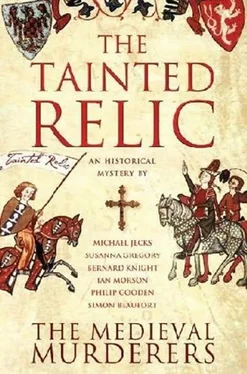The rest of the day passed well enough for the feretarius and the prior. Freed of its encumbrance, the shrine welcomed its numerous visitors, and the coffers started to fill. Beyond the press of the entertainers, pardoners and memento sellers who milled around the close in front of St Frideswide’s Priory, the town too benefited from the swell of pilgrims. Running north-south through Oxford, Fish Street was far busier than normal. The towers of St Michael’s at Southgate, and St Martin’s overlooking Carfax, marked the two ends of the busy street. In all, they were but two of some thirteen parish churches within the walls of bustling Oxford town. At the bottom end of the street, around South Gate, the firewood sellers were soon replenishing their wares. Farther along, the fishmongers rolled out more stout, stinking barrels of salted fish. Then, closer still to Carfax-the central crossroads-the stalls of the tanners and glove-makers, their narrow shop frontages hiding the tradesmen’s workshops behind, drew crowds like flies on meat.
By the early evening, the bustle at the heart of Oxford had died down somewhat. And as darkness fell, the tradesmen were deserting the streets, and securing their narrow shop frontages with shutters and bars. Honest English citizens retired behind their stout oaken doors. As did the equally honest members of the considerable Jewish community living on the eastern side of Fish Street, whose good sense told them to avoid confrontation by staying off the streets at night. For as night descended, another population stirred. The first to invade the streets was the army of rats and mice that fed off the leavings of the humans. But these scurrying denizens of darkness were comparatively harmless. Unfortunately, they did not have the night to themselves. The long winter evenings dragged on interminably for the young men studying at the university that formed the heart of the town. Boredom and the easy availability of drink provided a heady combination for those seeking to keep warm on a cold night before the curfew bell rang. Half the householders of Oxford brewed and sold beer, and drinking appeared to be an inevitable accompaniment to each step in a university man’s career.
That night, the watch, led by the town constable, Peter Bullock, plodded wearily along the broad aspect of the High Street. As they passed St Mary’s Church, Bullock saw a man he recognized as the feretarius of St Frideswide’s in earnest conversation with an Augustinian canon. In fact, it looked as though the conversation was getting a little heated, as Yaxley began waving his fist at the canon. The latter was a short, fat man with a lined face and little hair, and was unfamiliar to the constable. The monks of Oseney Abbey were not frequent visitors to the town. Bullock tensed, expecting to have to prevent an altercation. Then he was distracted by a group of raucous students in fine, but somewhat dishevelled, attire who burst from the church doors. Bullock shook his head in disdain as the youths staggered across the path of the watch, obscuring his view of the altercation, and down Grope Lane opposite. Guen’s bawdy-house was obviously in for some drunken customers, he opined. Straight from the sacred to the profane. The refrain of a familiar, taunting song drifted back up from the narrow alley.
Juvenes sunt lepidi,
Senes sunt decrepiti.
Bullock could not help but grin, taking in the wrinkled faces of his fellows. He himself was a squat man, with a bent back and a permanent scowl for a face. He was also well advanced in years-as were his colleagues of the watch. The students’ ribald song was appropriate. Youth is all charm, old age decrepitude. If his time as a foot-soldier had taught him one thing, it was the eternal truth that life was brief, youth exhilarating, old age a burden, and death a certainty.
‘Enjoy it while you can, boys,’ was his muttered benediction. When he looked back at the steps where the two monks had stood, they were gone. So he put the incident out of his mind. The watch proceeded towards East Gate, the last gate it had to secure to make the town safe for the night.
Just as they were swinging the gate closed, a figure on horseback slipped through the narrowing gap. The man, sitting astride a jaded palfrey, was tall and well built. He rode straight backed despite the signs of a long journey shown by the lather on the horse’s flank, and the splashes of mud on the man’s cloak. Bullock reckoned him to be a soldier of some sort from his bearing. But he could not see his face because of the hood that was pulled well forward to protect the traveller from the cold of the winter’s evening.
‘You are just in time, my friend,’ called the curious Bullock.
As he passed, the man eased round in his saddle, placing a gloved hand on the well-worn bags that hung across his thighs.
‘I hope so,’ was his enigmatic reply.
Bullock saw a flash of sharp, steadfast eyes set in a bronzed face that suggested the man had recently lived under hotter skies than the soft, misty climate of southern England. He had a feeling he knew the man, but could not place him. Then the rider was spurring the tired horse on. Bullock was left with the sight of a broad back, the clatter of hoofs on the stones of the street, and a sense of impending danger.
The second day of the festival was, if anything, even busier than the first. But all this activity created an unpleasant taste in the mouth of Brother Robert Anselm of Oseney Abbey. The tall, rangy monk with his gaunt face was every inch an ascetic. His dark, worn robes hung badly on his spare frame, as though he had lost a lot of weight lately. Which in fact he had, as he worried incessantly about the worm he saw boring into the soul of the abbey that had been his home for more than thirty years. This was the year of Our Lord 1269, the fifty-third of the reign of King Henry III. And despite the King’s virtuous translation of the body of St Edward the Confessor into a golden shrine for the greater glory of God, evil was rampant in England.
By the afternoon, the mayhem in the grounds of St Frideswide’s had got too much for him. It was not that the rival establishment to the abbey was drawing greater crowds, and therefore more income than his own Augustinian foundation. That mattered little to him. In fact he was glad that the current Abbot of Oseney, Ralph Harbottle, was elderly and reluctant to indulge in the unseemly battle for vulgar approval of the mob-the plebis frequentatio . No, what truly appalled him was the unholy marketplace full of sellers of wax effigies-used as offerings-purveyors of souvenirs, pilgrim badges and foodstuffs operating right at the doors of the church. Had not the Lord Himself driven the money-changers from the Temple? What was happening in the grounds of St Frideswide’s was a mockery of His actions. St Augustine’s own words came to his lips. ‘Business is in itself an evil, for it turns men from seeking true rest, which is God.’
Muttering, he turned up Northgate Street, past the weavers and corn merchants, and out through the gate where the Bocardo prison was incorporated into the walls of the town. Some unfortunate wretch hung his arm out of the narrow slit of a window in the prison, begging for food. Anselm ignored him. Outside the walls, the taint of sin was even worse than around St Frideswide’s. The ramshackle buildings there housed the sordidissimi vici -the stews of loose women, and the thieves’ kitchens of Broken Hays. Robert Anselm was glad finally to be free of it all, and hurried over the two bridges that crossed the fast-running streams that fed the Thames to the west of the town. The second bridge was rickety, without a handrail, and he walked over with caution. Once over, however, he strode out more certainly along the westerly causeway towards the abbey.
Читать дальше












